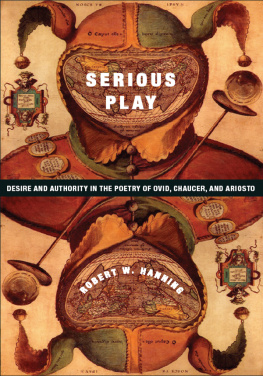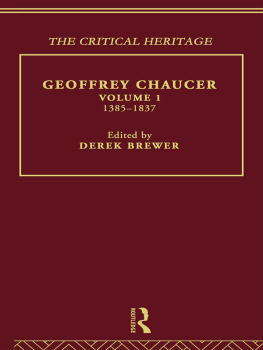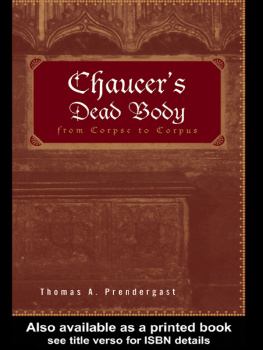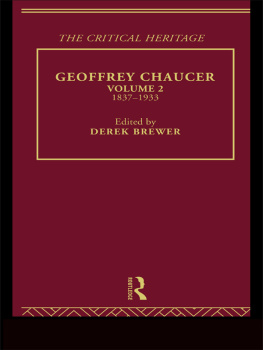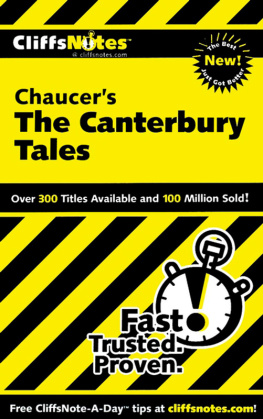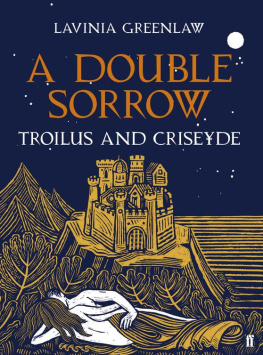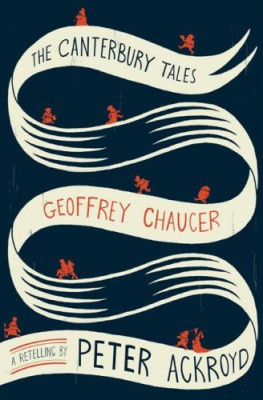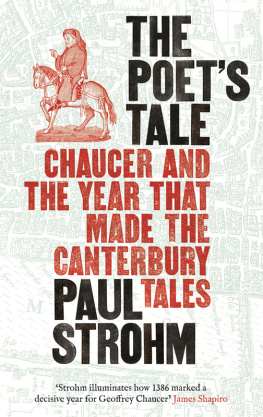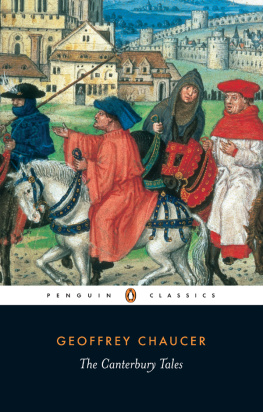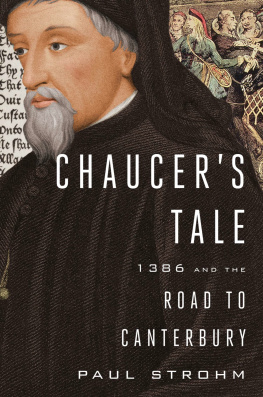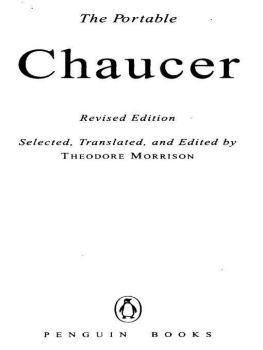PLAYING THE CANTERBURY TALES
For Teresa
Playing the Canterbury Tales
The Continuations and Additions
ANDREW HIGL
Winona State University, USA
ASHGATE
Andrew Higl 2012
All rights reserved. No part of this publication may be reproduced, stored in a retrieval system or transmitted in any form or by any means, electronic, mechanical, photocopying, recording or otherwise without the prior permission of the publisher.
Andrew Higl has asserted his right under the Copyright, Designs and Patents Act, 1988, to be identified as the author of this work.
Published by
Ashgate Publishing Limited
Wey Court East
Union Road
Farnham
Surrey, GU9 7PT
England
Ashgate Publishing Company
Suite 420
101 Cherry Street
Burlington
VT 05401-4405
USA
www.ashgate.com
British Library Cataloguing in Publication Data
Higl, Andrew.
Playing the Canterbury tales: the continuations and additions.
1. Chaucer, Geoffrey, d. 1400. Canterbury tales. 2. Chaucer, Geoffrey, d. 1400 Parodies, imitations, etc. 3. English poetry Middle English, 11001500 History and criticism. 4. Tales, Medieval Criticism, Textual.
I. Title
821.1dc22
Library of Congress Cataloging-in-Publication Data
Higl, Andrew.
Playing the Canterbury tales: the continuations and additions / by Andrew Higl.
p. cm.
Includes bibliographical references and index.
1. Chaucer, Geoffrey, d. 1400. Canterbury tales. 2. English poetryEarly modern, 15001700. 3. Manuscripts, English (Middle) 4. Tales, Medieval. 5. Chaucer, Geoffrey, d. 1400Authorship. I. Title.
PR1872.H54 2011
821.1dc23
2011035396
ISBN 9781409427285 (hbk)
ISBN 9781409427292 (ebk)
ISBN 9781409479130 (ebk-ePUB)
Contents
List of Figures
List of Abbreviations
BL | British Library |
MED | Middle English Dictionary |
MS | manuscript |
OED | Oxford English Dictionary |
Acknowledgements
This book originally developed at Loyola University of Chicago. I am most grateful for the direction and counsel I received as I completed research I hoped would eventually evolve into a book. I am thankful to my publisher Ashgate for agreeing to make that possible. I was fortunate enough to have the guidance of several textual critics working in fields other than medieval literature. With the patient support and advice of Steven Jones and Peter Shillingsburg, I was able to see my project fitting into book history broadly. Oftentimes it is easy to separate literary periods into silos and avoid a really big picture of history. It is also easy to avoid making connections between unrelated historical periods. They helped me see connections and find ways of expressing my transhistorical arguments in ways that were rigorous and not guilty of pointless anachronism.
I am grateful to Edward Wheatley, who read my work with the utmost understanding and patience. He allowed me the freedom to develop a project as a graduate student with the hope of my work eventually culminating in a book. Though he was my director in name, he was first and foremost a reader and observant critic. Not only was that freedom intellectually rewarding and ultimately helpful, but it will undoubtedly serve as a model for my work with students in the future.
I am thankful for the additional feedback I received early in the projects life from C. David Benson. I appreciate the feedback of the readers of versions of individual chapters, including Derek Pearsall.
To the staff of the special collections department at the University of Chicagos Regenstein Library, I am grateful for their permission to use their archives and their patience as I paged box after box of photostatic images. I was fortunate enough to get to examine the very same images used by Manly and Rickert. Unfortunately, this remains the only viable way to compare images of all the manuscripts side by side without incurring massive photo duplication expenses.
Without the help and assistance of Winona State University, where I hold a position in the English Department, I would not have been able to present my work at conferences around the world and get the feedback I needed to bring the project to this final state. My colleagues in the English Department have been extremely supportive, and it is a pleasure to work with them.
I am grateful for the support of my family, including my parents, sister, in-laws, and especially my wife Teresa. Her encouragement and unflinching caring have made writing this book anything but a lonely process. Most valuably, for the sake of balance, she reminds me there is more to life than my work, and so I dedicate my book to her.
Introduction
Henry Jenkins, a new-media cultural critic, coined the term convergence culture during the first decade of the twenty-first century, most notably in his 2006 book Convergence Culture: Where Old and New Media Collide. Since then the term has been bandied about in various fields including cultural studies, literary studies, media studies, and communication studies and has taken on sundry meanings not all of which are clearly expressed in Jenkinss own work. Though he never offers a neat and tidy definition of convergence culture, a key feature of this new culture is the recent rise in participation, marking a convergence between the consumption and production of cultural texts. Increasingly in new media, fans can interact with cultural expressions in significant ways, contributing to the texts development and eventual meaning.
In many ways, I had a convergence moment of my own. Studying the multifarious manuscripts and early printed versions of medieval works and reading this new-media theorist, I noticed an historical convergence of sorts. First off, postmodernism has taught us that there is little new under the sun; so much of what we see as new in new media often has some precedent somewhere in the past in some form if we look closely enough at history. Jenkinss idea of old media in the title of his book seems to refer more to television shows such as Lost and mass-market books such Harry Potter, which have accommodated themselves to convergence culture, rather than the old medieval media I have in mind. Second, and most relevant to the present book, one of the oldest and most canonical of all the works in the English literary canon, the Canterbury Tales, has a history of transmission and reception in which acts of consumption and production converged. Though often ignored, these post-Chaucer continuations and additions to the Tales remain in the extant manuscripts and early printed editions but unseen in the modern editions of Chaucers works because editors have condemned them as spurious and apocryphal.
The OED defines spurious variously: begot or born out of wedlock; illegitimate, bastard, adulterous and superficially resembling or simulating, but lacking the genuine character or qualities of, something; not true or genuine; false, sham, counterfeit among others. in new media, we have the unique opportunity to reconsider and historicize past forms of mobile, interactive textual creations as something more aesthetically and socially valuable than just spurious corruptions of the autonomous authors work. Perhaps, as we come to better understand pre-modern textual models not centered on the autonomous author, we might welcome these bastardized texts back into the fold.
Next page

